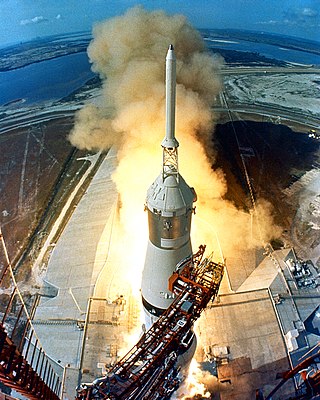 Man walks on the Moon, July 20 1969
Man walks on the Moon, July 20 1969

In response to a recommendation by then-President John F. Kennedy in 1961, that the United States should "commit itself to achieving the goal, before the decade is out, of landing a man on the Moon and returning him safely to Earth", the Apollo Program was born, and NASA, the National Aeronautics and Space Administration, set about the task of making the president's wish come true. There was of course more to this than honouring the wish of a now-deceased President. America was at the time locked in an arms race with the USSR which had led to the almost world-shattering standoff in the Cuban Missile Crisis of 1962, and though the Cold War, the ongoing thinly-veiled hostilities between the two superpowers had cooled down slightly after seeing that they had almost between them initiated the destruction of the Earth, both were now looking to gain an advantage over the other and both looked to the stars, as the arms race was exchanged for the space race.
The Soviets won that, being the first nation on Earth to launch an artificial satellite into space (Sputnik, 1957), but this was unmanned, and both superpowers wished to be the first to put a man into space. Four years later, America lost that race too as the USSR sent Yuri Gagarin into orbit around the Earth. Frustrated, and wary of the Soviet Union's growing capability with spaceworthy rockets, President Kennedy announced that very year that the US would land a man on the Moon. In order to facilitate this, and other American space endeavours, NASA had been created in 1958 and it was of course to this organisaton that the American public looked for their salvation from the ever-increasing encroaching of the Russians (as they were at the time) into space. The US knew they had to put down a firm marker, make a foothold for themselves in space or all their earthbound military might could avail them nothing should the Cold War heat up.
It was however to be an inauspicious and indeed tragic start to the missions, when Apollo 1 developed problems leading to a control cabin fire before launch, killing all the crew. Apollo 5 however launched and orbited the Earth, while Apollo 7 orbited the Moon with Apollo 8 coming close to the moon's surface, but not landing, in the lunar landing vehicle. By now it was 1969 and preparations were underway for the launch of what was to be NASA's most important mission.

Apollo 11 was crewed by three men whose names have now gone down in history and who are forever associated both with bold adventure and exploration, and of course specifically with the Moon. Captained by Commander Neil Armstrong, with Michael Collins and Edwin "Buzz" Aldrin (who would be and is forever after known by his nickname) Apollo 11 lifted off from Kennedy Space Centre on July 20 1969 and as far as local time was concerned arrived at the Moon the next day, basically six hours later, so that when Armstrong made his famous moonwalk he was in fact doing so on June 21, Earth time. The event was of course broadcast all over the world, and the Soviets must have been fuming, watching the footage. Their own space programme had stalled somewhat due to the death of its chief engineer and also the debate as to its necessity, and now the capitalists had (eventually) stolen a march on them. And it was the most important victory to win: it was all very well sending a piece of metal into space, or having a man orbit our home planet, but who would be remembered: Gargarin or Armstrong? Of course, both men are, but a schoolchild even today could tell you that Neil Armstrong was the first man to walk on the Moon, whereas they might be hard-pressed to name the Russian cosmonaut.

After the initial euphoria of the mission had died down, and NASA had gone to the Moon six more times --- viewed with a sense of excitement slowly fading to apathy and finally disinterest --- the Apollo programme was retired in 1972. After this with relations thawing between the superpowers there was a joint space effort by the US and the USSR, effectively bringing the Cold War to an end, millions of miles from the planet it could so easily have destroyed. Though the Moon landing has of course gone down as a legendary and pivotal event in world history, and proved beyond all doubt that it was America who had the upper hand in space travel, doubts began to creep into the public mind afterwards, as people questioned the massive financial outlay on the programme, and the idea that these millions of dollars could have been better spent trying to help those at home rather than send men off to what is essentially a dead rock in space. It's true that NASA and the US Government did little with their achievement, more a case of "because it's there" and "because if we don't the Commies will" than any actual desire to get to the satellite and, what's more, without any real plan as to what could be done once we got there. Plans are in hand for a return mission in the next few years, with very clear ideas about setting up a moonbase to lead to an eventual colony there. Whether this will happen or not is open to conjecture, but perhaps it's time Mankind took its second giant step, and learned how to walk into the future.